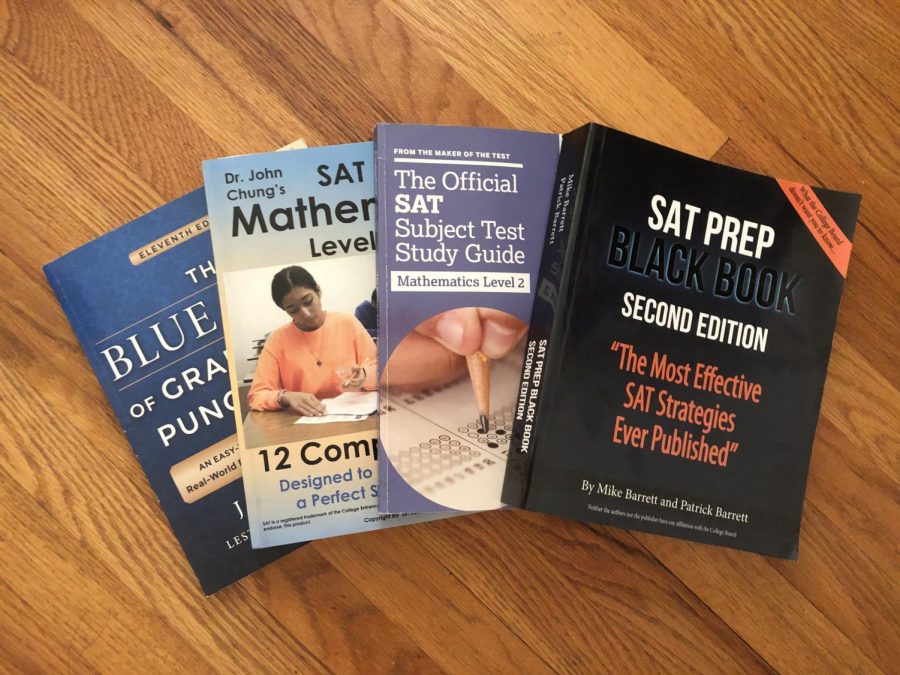As the class of 2021 graduates from McLean, the class of 2022 is now transitioning into the college admissions process. Most colleges have altered their admissions processes for the upcoming class of 2022 as a result of the pandemic.
“Most colleges were test-optional for the class of 2021 and will remain test-optional for at least one more year. Everything else regarding the application process is the same,” Laura Venos, McLean’s College & Career Specialist said. “It was a difficult time for seniors because they couldn’t easily and safely visit colleges while they were researching them. Online tours and programs helped, but thankfully colleges are opening back up to visitors.”
The SAT and ACT exams have also changed for the class of 2022, but most McLean students are still taking either exam.
“The [ACT and SAT] are not required at most colleges for the class of 2022. However, most students are still planning to take them because they are required at some colleges for admission and they are also helpful in the scholarship process,” Venos said. “We encourage students to take a practice SAT and a practice ACT, pick your favorite, and then take that test and see how it goes. If you don’t like your score and you’re applying test optional, you don’t have to submit your score.”
Venos predicts that the large number of test-optional schools may have an adverse effect on competition between students.
“Unfortunately, the more uncertainty students have in their college application process, due to the pandemic and not visiting colleges, the more colleges students applied to,” Venos said. “That is what makes the college admissions process more competitive. We recommend students apply to 5-8 colleges. When everyone starts applying to 15-20 colleges, the application landscape statistically becomes more competitive because colleges are flooded with applications.”
New FCPS Grading Policies
In response to increasing failing marks and challenges posed by the pandemic, Arman Nikmorad, the supervisory council representative from McLean and student government president, sent a survey to the school board emphasizing the need for lenient grading policies.
“This is [the opinion of] 300 McLean students that [took] this survey, I really think it is going to be effective and a game changer,” Nikmoard said.
As a result of this survey, FCPS implemented policies allowing students to switch two of their classes to pass/fail rather than a letter grade. Not everyone, however, views these new policies as a success.
“I think that allowing students more flexibility is a good thing during this pandemic time, because many students have struggled with virtual learning,” Counselor Kathleen Otal said. “Allowing them more options with their grades, that can kind of help alleviate some stress, hopefully. So I definitely don’t think it hurts. It may help but I’m not positive about that.”
While these changes may ease the burden on students, college admission officers view them in a different light.
“The NCAA and several colleges would assume that [a passing grade] is a D, or maybe a C. But they would not assume that that is a high grade,” Otal said.
Students concerned about grades have also considered changing their grades to pass/fail marks.
“I’m not really sure what to do,” said rising senior Brinda Srivatsan. “Since my grades aren’t what they usually are, I feel compelled to immediately change some of them to a [pass or no mark] because I don’t want it to affect my unweighted GPA. But that’s the thing — it’s only affecting how my transcript looks and my unweighted GPA.”
Srivatsan, like many other students, is torn. She isn’t sure what colleges are looking for, and the new grading policies have left her even more wary of the upcoming admissions process.
“I am nervous about what to do because I am scared it will make me look bad with worse grades in a few classes than others,” Srivatsan said. “But no matter what decisions I make, I’m going to have consequences which will make me look bad to colleges. It’s an avoidance-avoidance conflict.”
Changes to Standardized Testing
As a result of the pandemic, college admissions requirements regarding SAT requirements changed. They have become highly controversial, leaving many students worried that it will now be more difficult for them to get into the college of their choice. For rising senior Doris Zhang, the SAT is incredibly important.
“I feel like academics is probably the main redeeming factor that’s going to get me into college because I don’t really do any extracurriculars,” Zhang said. “[The SAT] could boost my college applications.”
Zhang is counting on the SAT to help her applications stand out. Like many of her classmates, she has devoted countless hours to preparing for the exam. But the recent updates left her worried that all of her efforts might have been wasted.
“I’ve taken [the SAT] twice now,” Zhang said. “But I also did a lot of mock SATs in eighth grade.”
The COVID-19 pandemic prompted many large universities to announce plans to become test-optional. While institutions have repeatedly insisted that the decision to withhold test scores will not impact admissions, some students are still skeptical.
“[I’m] worried that they’re just going to assume that I did really badly on [the SAT] if I don’t submit my scores,” Zhang said. “If they see I was doing well in school, they might think [I] must be good at academics. But then if I didn’t even submit my SAT, they might assume that I [scored very low].”
Counselors, teachers, and administrators alike have made it clear that choosing not to send an ACT or SAT score will not impact a college’s decision to accept you.
“Test-optional means test-optional. Deciding not to submit a score will put more emphasis on the other parts of your college application,” Venos said.
Even with the numerous schools that are test-optional for rising seniors, students are reluctant to apply without submitting a test score.
“I would not apply to a school without submitting test scores because I want the college admission people to base me off of my GPA, but also my SAT score, which I’m hoping will be ‘better’ than my GPA,” rising senior Clara Hyun said.
The intense, high-pressure academic environment at McLean has discouraged many people from withholding scores, too.
“I’ve felt, and still feel, [this high pressure] all the time, especially because I know that I’m surrounded by many academically outstanding people,” Hyun said. “When you’re applying to college, you’re compared to other people in your school, so I feel very pressured to compete against others.”
In addition to these changes, the College Board recently decided to discontinue the optional essay and SAT subject tests. Though the decision left some students elated, it left others in shock.
“I spent a lot of time preparing for [the subject tests],” Zhang said. “And I think the subject tests were actually a good idea. You could choose one subject that you think you could do well on and [is relevant to] the path that you want to take in college. And [your score] would be reflective of how well you could do on something that you are actually passionate about.”
Recently, the University of California system, one of the largest in the nation, announced that they would be going “test-blind” through the 2024 admissions cycle. The school system will no longer accept test scores from prospective students, and until 2024, they will have no impact on admissions decisions. For many students, this approach seems completely unreasonable.
“It’s not fair at all,” Hyun said. “Some students may feel that the SAT score is another chance for them to score higher or have a better chance of getting into a selective college, especially for the people that aren’t doing extracurriculars and are relying on their academics and test scores to get them into college.”
Several students instead suggest that applicants should always have the choice to submit their test scores.
“I think, if we had the choice to [submit scores], then the people that need it can show that they’re good at testing and the school-work side of things,” Zhang said. “But then, if you don’t want to, or if that’s not your strength, then you can have the option not to.”
Still, some argue that standardized tests are not necessarily the best reflection of a student’s academic capabilities.
“[These methods of] determining a student’s intelligence [are] completely inaccurate. Intelligence shouldn’t be measured based on a test grade, an AP exam score, or SAT/ACT score. Some individuals aren’t as good at test-taking as others and because of this they get a lower grade even if they know the subject to a great extent,” said rising senior and McLeadership executive Gianna Di-Reumante. “Testing is very stressful and when people are put under [difficult] situations it doesn’t result in anything good a majority of the time.”
Some large universities are seemingly in agreement, and many have considered adopting their own standardized tests. Amid such a tumultuous year, the class of 2022 is more nervous than ever before for the upcoming college admissions process.
“I’m still pretty nervous about the college application process because there’s just a lot of work that goes into it,” Di-Reumante said. “Yes, some colleges have made certain things optional, but for the most part, the process is still the same. I think scores like the SAT/ACT should just be omitted from the application process anyways because it doesn’t necessarily determine whether a person will succeed in college or in a career.”









